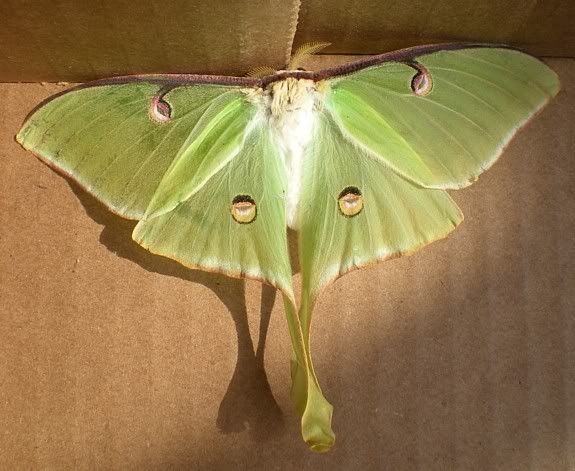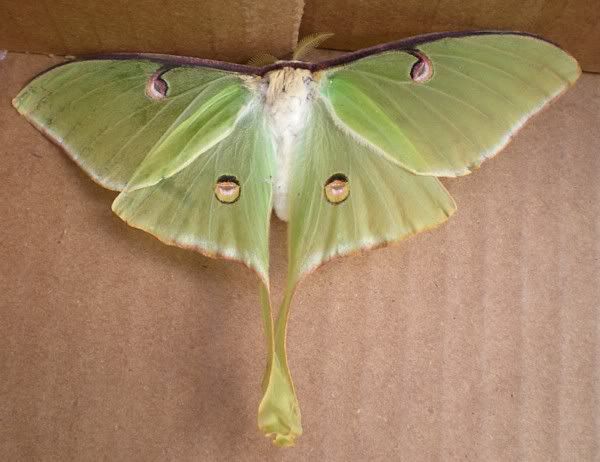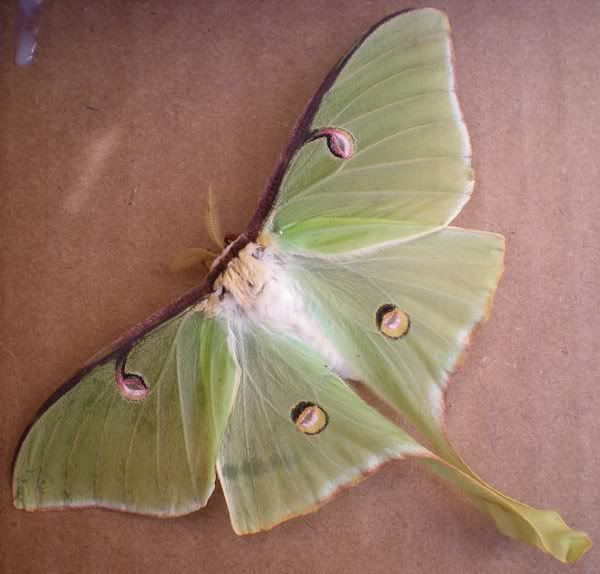Luna Moth (Actias luna)
I didn't mean to start collecting bugs, but when I spotted this thing on the ground in the parking lot after work today I couldn't just leave it there. I was bringing a cardboard box home anyway, so I slid it gently onto my newspaper and stuck it in the box. Turns out it isn't dead though; it must have been attacked by a bird or something, because at least one of its legs is damaged. It's been flapping around in the box, but it can't fly. I had to put the box out on the porch to keep the cat from attacking it, and I've left the box open on the chance that after some rest it will be recovered enough to go along on its way, but I'm not hopeful. If it doesn't survive I'd like to look into mounting it in a shadowbox, but preserving moths & butterflies was never one of my areas of expertise as a junior naturalist. I've been trying to look up a way to euthanize it on some entomology sites, but most of them suggest moth balls (duh), which I won't touch because they are carcinogenic and otherwise generally bad news for humans, cats, et. al. Alternative suggestions/ideas, please?




EDIT: He's off! Once the sun went down and it was dark the moth started fluttering around like crazy, so I tipped the box on its side and he flew away somewhat drunkenly over the rooftops, which made me think of The Last Unicorn :p I know it probably won't live that long anyway--insects never have a huge life span--but I feel better knowing that at least I didn't leave it to be squashed in a supermarket parking lot.
EDIT 2: Couple of research facts from the Wikipedia entry on Luna Moths. Now I almost wish I'd kept him--they only live a week and they don't eat?! Oh well, I hope he finds a lady moth; or if it's a she (which I think it might have been after comparing the pictures in the Wiki gallery to mine), that she lays some eggs somewhere in South Philly!
Although rarely seen due to their very brief (1 week) adult lives, Luna Moths are considered common. As with all Saturniidae, the adults do not eat or have mouths. They emerge as adults solely to mate, and as such, only live approximately one week.




EDIT: He's off! Once the sun went down and it was dark the moth started fluttering around like crazy, so I tipped the box on its side and he flew away somewhat drunkenly over the rooftops, which made me think of The Last Unicorn :p I know it probably won't live that long anyway--insects never have a huge life span--but I feel better knowing that at least I didn't leave it to be squashed in a supermarket parking lot.
EDIT 2: Couple of research facts from the Wikipedia entry on Luna Moths. Now I almost wish I'd kept him--they only live a week and they don't eat?! Oh well, I hope he finds a lady moth; or if it's a she (which I think it might have been after comparing the pictures in the Wiki gallery to mine), that she lays some eggs somewhere in South Philly!
Although rarely seen due to their very brief (1 week) adult lives, Luna Moths are considered common. As with all Saturniidae, the adults do not eat or have mouths. They emerge as adults solely to mate, and as such, only live approximately one week.